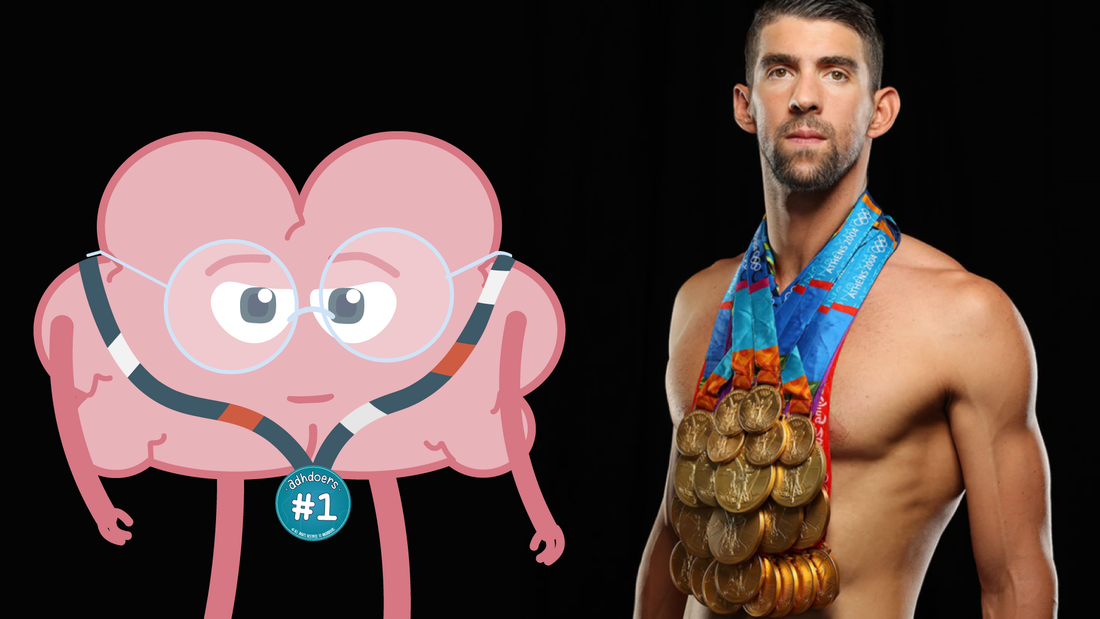Michael Phelps is the most decorated Olympian of all time, no wonder he's one of the most successful athletes in the history of sports. But what many people don't know about Michael Phelps is his battle with ADHD.
Here are answers to some questions that probably crossed your mind about him 😁
Q: How did Micheal get an ADHD diagnosis?
A: Michael Phelps found out he had ADHD from his mom. He was in the second grade and had trouble focusing on his homework.
His mom took him to the doctor, who diagnosed him with ADHD.
At first, Michael was worried about being labeled as “the ADHD kid”—but after talking to other kids with ADHD, Michael realized that they had some pretty cool skills.
Q: What does his daily routine look like?
A: The swimmer is definitely onto something when it comes to working out and meditation.
His daily routine is usually a healthy mix of physical exercise and mindfulness, rather than focusing exclusively on one or the other.
Exercise keeps your endorphins going and prevents your body from getting used to the pleasurable effects you'd get from obsessively checking Facebook every fifteen minutes.
Meditation also helps keep your mind focused on what truly matters in life: spending time with family and friends, being grateful, and enjoying the amazing experiences that life has to offer.
Q: How does he get motivated to get stuff done?
A: Micheal is a very goal-oriented person. He knows what he needs to accomplish and what the end result needs to look like in order for him to feel successful.
He has learned over time how his ADHD affects his ability to work productively, so now he has strategies in place for dealing with it (like having specific times of day where it's okay for him to have distractions).
The fact that he can use these strategies means that he has some self-awareness about his condition, which also helps him stay productive and motivated.
Q: How has having ADHD affected his training as an Olympic swimmer?
Michael tried to train for the Olympics when he was a kid.
He didn't know how to focus on anything but the pool, and he would usually get bored easily.
His mom got him some toys that would float in the water and kept him entertained while he trained.
Michael also had trouble with impulsive behavior when he was younger—he'd jump into a pool without checking the depth first or start running around without thinking about what could happen if someone tripped over him accidentally during practice runs!
Q: Has ADHD caused any significant challenges in his career?
A: In an interview with ESPN, Phelps said that it was difficult for him to focus on the pool when he was swimming.
Luckily, the diagnosis allowed him to learn how to manage his symptoms more effectively and get more out of his training sessions. He also learned how to set goals for himself. In fact, he credits his coach Bob Bowman with helping him stay focused during training sessions.
Q: What tips does he offer to ADHDers?
A:” Don't be afraid to ask for help”.
The most important piece of advice for him is to surround himself with positive people. Find a coach or mentor who understands your disorder, and can help you manage your symptoms and cope with your ADHD.
“ Remember, this disorder does not define you.”
Q: How was his relationship with his coach?
A: It's no secret that Michael Phelps and his coach, Bob Bowman, have an incredible relationship.
Their bond is so strong that they've been able to make it through the thick and thin of it all—from triumphs to failures, again and again.
But It wasn’t all sunshine and rainbows since the two argued so much that they didn't even talk to each other for months. Phelps even considered quitting swimming altogether a few times because he was so upset with his coach...
As an ADHDer, Micheal used to act on impulse before considering the possible consequences of his actions. He may blurt out inappropriate comments or say something mean without thinking about how it will affect others — even if he cares deeply about them.
Michael Phelps' diagnosis with ADHD is huge, as it may help kick start a conversation and ultimately lead to better treatments and services to help those who suffer from this disorder (and its variations) every day.
So while there is no shame in having ADHD, Michael Phelps being open about his disorder, and advocating for others to do the same, is definitely a step in the right direction.

